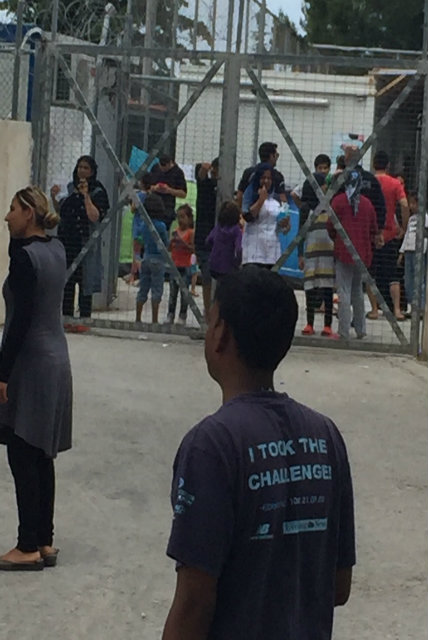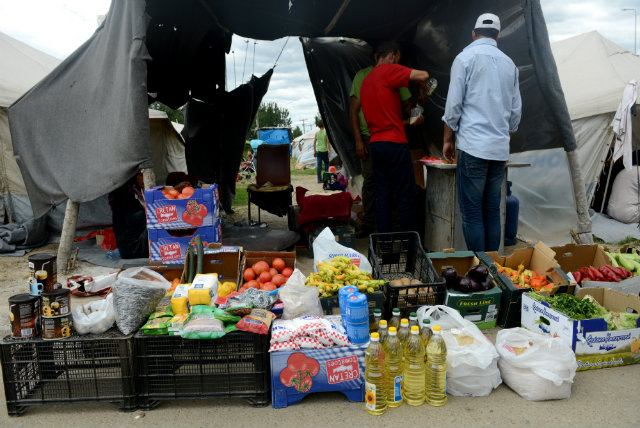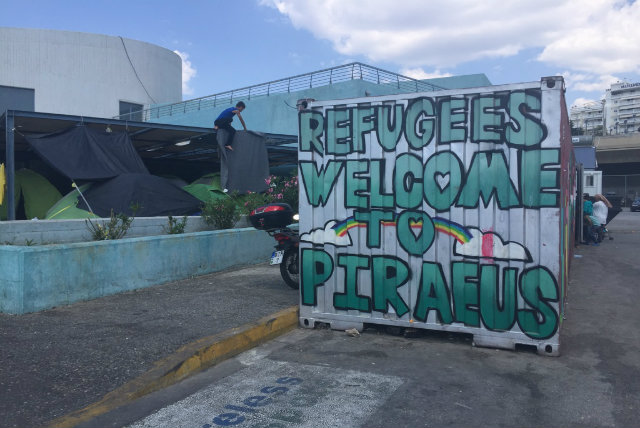Clare visits Greece
The Song of the Vineyard
“They shall build houses and inhabit them;
they shall plant vineyards and eat their fruit.” (Isaiah 65: 21 NRSV)
The Bible has many stories and passages that speak about the idea of the vineyard. In Isaiah the vineyard features as part of the vision of a new heaven and a new earth – the idea that the people shall plant vineyards and eat their fruit is for me a symbol of home, of rootedness of belonging.
In Isaiah 5, the people of Israel and Judah are likened to the vineyard and God sings a song of lament and love for God’s vineyard as it lies in tatters. What does God make of seeing God’s vineyard in tatters? How can God sing the song of the vineyard when humanity has made such a pig’s ear of it? How can God sing the song of the vineyard when so many people have been uprooted from their homelands by war, violence and poverty? How can God sing the song of the vineyard when so many people are camped out across Greece, Turkey, Lebanon and Jordan and can't build their own houses or plant vineyards and eat their fruit?
 But God does sing a lamenting song of the vineyard; even in the midst of so much suffering, bread is broken and wine is shared – a lament to the lives interrupted and put on hold, a lament to the lives lost to the Aegean Sea, a lament to the lives eked out in refugee camps and behind razor wire, a lament to the lives trafficked or abused, a lament…
But God does sing a lamenting song of the vineyard; even in the midst of so much suffering, bread is broken and wine is shared – a lament to the lives interrupted and put on hold, a lament to the lives lost to the Aegean Sea, a lament to the lives eked out in refugee camps and behind razor wire, a lament to the lives trafficked or abused, a lament…
But also a celebration – a celebration and testimony to the wonderful stories of humanity reaching out in generosity, a celebration and testimony to the stories of survival, a celebration and testimony to the stories of family and friendship, a celebration and testimony to the stories of creativity and a sign of the vineyard blossoming with new life….
And so I have written a song of the vineyard based on our visit to Greece. It is a song of lament but also of hope. May we have the courage to be the body of Jesus broken and poured out for the life of the world.
How can I sing a song of my vineyard
the earth lies tattered and in ruins?
War rages, not once but in country after country
bombs rip apart homes and businesses
Fear of terror has become fear of the stranger
of the people who arrive in only the clothes they wear
Politicians meet to keep refugees at arms length
closing borders and building razor wire camps.
How can I sing a song of my vineyard
the vines lie in tatters, ripped from the earth?
I have given my vineyard the best of everything tended it with sun and rain
but it’s fruits are small and withered, disease is rife I looked for good fruits
but you have produced a poor harvest
the produce you should have enjoyed
lies rotting in the ground
How can I sing a song of my vineyard?
But I will sing a song of my vineyard
the earth is more resilient and beauty radiates!
Greek people give of their food and their time
to meet and drink coffee with people in tents
A man opens a fruit and veg stall
and women bake flat breads over an open fire
Ninety year old women open their homes and make up spare beds
for the survivors who have made it across the Aegean Sea.
But I will sing a song of my vineyard
a song of my beloved who gently tends the vine!
Who feeds and waters and lifts the shoots out of the dust
splicing the vine together with words of encouragement
My beloved, who on the night the vines became gnarled and twisted ensnaring him and betraying him, fearful of a beautiful garden
Took bread, the labour of the harvest
and broke it for the vineyard, dust to dust ashes to ashes
Took wine, the fruit of the vine
and poured out his blood to enrich the soil.
This is my body, broken for you
This is my blood poured out for the life of the world
And what became of the song of my vineyard
the song of my beloved now buried in the ground?
My beloved’s love could not die, could not lie hidden
it springs from the ground, pushing up through the soil
Life pulses through the vineyard, flowers blossom
bees hum and birds sing in celebration
Ruined vines are once again tended with patience
broken trusses lovingly spliced back onto the vine
The fecundity of the vineyard embraces the brokenness
and the grapes are sweet and ripe and ready for the harvest.
© Clare McBeath & Tim Presswood, adapted 2016
We are all migrants as well as hosts

A few weeks ago we took a risk. We took a risk in suspending the regular teaching programme at Luther King House (Manchester) for a week. Instead, we gathered the whole community to reflect theologically on a theme, a theme we hear almost daily on our radios and TVs, that of migration.
But we didn’t want to just reflect on the stories of migrants out there, in Calais, Greece or Turkey. We recognized that a large proportion of our students are themselves migrants with stories to share and from whom we could learn. So we began by giving everyone their travel permit and lining up according to how far we had travelled on holiday or for work. We learned that many of us travel almost without thinking about it and I for one, take for granted that I can travel anywhere in the world.
We listened to each other’s stories - stories from Rwanda, The Democratic Republic of Congo, Zimbabwe, South Africa, Eritrea…. We heard stories of horror, of violence, extreme poverty and rejection and stories of hope, of hospitality, welcome and celebration. Together we learned some of the statistics behind the news headlines and challenged ourselves to unmask the negative language of the media .
Together we learned stories of migration going back to the very origins of humanity in Africa, migrations within Europe, colonialism and the transatlantic slave trade, the second world war and economic migration post world war II. In other words we learned that migration is normal and has often has a religious dimension. We looked too at the Bible and its diverse voices and stories of migration which we can see reflected in current debates.
So where did all this leave us theologically? It left us exploring issues of identity and celebrating diversity. It left us questioning boundaries and challenging the media stories we are fed. It left us with a deep sense of needing to confess that many of us have benefitted from being citizens of a colonial power and wanting to seek reconciliation. It helped us to see that the church is migrating as well as hosting. That God, Jesus and the Holy Spirit offer hospitality but are also the migrant on the move.
In short, it helped us get beyond the them and us. To move to a place where we are all in some sense leaving home to embark on a journey. To offer hospitality, to call for jubilee and mutual interdependence, to embrace change and movement with a child-like playfulness. In short, to recognise that we need a new vision where all are migrants in solidarity with one another.
So why is this a call to action? How does this embody a vision of a church for the poor? Because these distinctions of them and us, rich and poor, host and migrant, the western world and the global south are breaking down and we are called to cross these boundaries. We are called by the God who had nowhere to call home to let go security and embrace a radical openness to each other. We are called by the crucified God to let go of power and embrace vulnerability. We are called by the resurrected God to let go of fear and live out a radical love, a new community, God’s kin-dom here on earth. And it starts with us, each one of us.